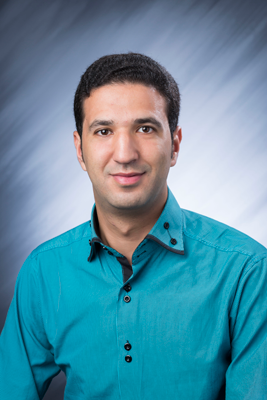IMDEA Networks

Defensa Tesis Doctoral: Opportunistic Timing Signals for Pervasive Mobile Localization

Aymen Fakhreddine, Estudiante de doctorado, IMDEA Networks Institute & Universidad Carlos II de Madrid, Madrid, España
PhD Defense
The proliferation of handheld devices and the pressing need of location-based services call for precise and accurate ubiquitous geographic mobile positioning that can serve a vast set of devices. Despite the large investments and efforts in academic and industrial communities, a pin-point solution is however still far from reality. Mobile devices mainly rely on Global Navigation Satellite System (GNSS) to position themselves. GNSS systems are known to perform poorly in dense urban areas and indoor environments, where the visibility of GNSS satellites is reduced drastically. In order to ensure interoperability between the technologies used indoor and outdoor, a pervasive positioning system should still rely on GNSS, yet complemented with technologies that can guarantee reliable radio signals in indoor scenarios. The key fact that we exploit is that GNSS signals are made of data with timing information. We then investigate solutions where opportunistic timing signals can be extracted out of terrestrial technologies. These signals can then be used as additional inputs of the multi-lateration problem.
Thus, we design and investigate a hybrid system that combines range measurements from the Global Positioning System (GPS), the world’s most utilized GNSS system, and terrestrial technologies; the most suitable one to consider in our investigation is WiFi, thanks to its large deployment in indoor areas. In this context, we first start investigating standalone WiFi Time-of-flight (ToF)-based localization. Time-of-flight echo techniques have been recently suggested for ranging mobile devices overWiFi radios. However, these techniques have yielded only moderate accuracy in indoor environments because WiFi ToF measurements suffer from extensive device-related noise which makes it challenging to differentiate between direct path from non-direct path signal components when estimating the ranges. Existing multipath mitigation techniques tend to fail at identifying the direct path when the device-related Gaussian noise is in the same order of magnitude, or larger than the multipath noise. In order to address this challenge, we propose a new method for filtering ranging measurements that is better suited for the inherent large noise as found in WiFi radios. Our technique combines statistical learning and robust statistics in a single filter. The filter is lightweight in the sense that it does not require specialized hardware, the intervention of the user, or cumbersome on-site manual calibration. This makes the method we propose as the first contribution of the present work particularly suitable for indoor localization in large-scale deployments using existing legacy WiFi infrastructures. We evaluate our technique for indoor mobile tracking scenarios in multipath environments, and, through extensive evaluations across four different testbeds covering areas up to 1000m2, the filter is able to achieve a median ranging error between 1.7 and 2.4 meters.
Read the full abstract here. [PDF  98 KB]
98 KB]
About Aymen Fakhereddine
Aymen Fakhreddine received the M.Sc. degree in advanced wireless communications systems from CentraleSupélec, Paris, France, in 2012, the M.Eng. degree in telecommunications from INPT Rabat in 2012, and the M.Sc. degree in telematic engineering from the University Carlos III of Madrid in 2014. He is pursuing the Ph.D. degree with IMDEA Networks Institute and the University Carlos III of Madrid. He is currently involved in pervasive localization systems. He also held a Research Intern position with Bell Labs France, where he focused his research on LTE mobility optimization and a visiting researcher position with the Singapore University of Technology and Design.
La defensa de tesis se realizará en inglés
Supervisor de tesis: Dr. Domenico Giustiniano, IMDEA Networks Institute
Universidad: Universidad Carlos III de Madrid, España
Programa de doctorado: Ingeniería Telemática
Miembros del comité:
- Presidente: Francisco Barceló-Arroyo, Universitat Politecnica de Catalunya (UPC)
- Secretario: Paolo Casari, IMDEA Networks Institute
- Portavoz: Marco Fiore, CNR – IEIIT
Más información
- Tesis doctoral: “Opportunistic Timing Signals for Pervasive Mobile Localization”
- Publicaciones de IMDEA Networks: Tesis
- Estudiantes de doctorado en IMDEA Networks
- Red de Alumni

